Leslie Uggams, an enthralling performer hailing from Harlem, has carved a captivating path as an actress, gracing both the stage and the silver screen. Her illustrious career spans an impressive seven decades, a testament to her prowess.
Emerging as a prominent figure in showbiz, Uggams is perhaps most prominently recognized for her standout portrayal within the Deadpool series. However, it’s not just her professional journey that intrigues. In 1965, her union with Grahame Pratt, a White Australian man, wove a love story so enduring that it could easily inspire a cinematic masterpiece. Their bond persevered through eras, defying the challenges of interracial love, a saga deserving of the spotlight.
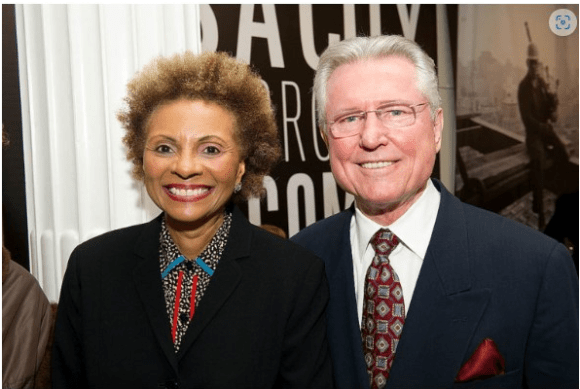
Talent seemed to be Leslie’s constant companion from an early age. Remarkably, at the tender age of 10 in 1953, she stepped into the recording realm with a record for MGM, showcasing her exceptional singing abilities. Nurtured by the musical guidance of her aunt, the singer Eloise Uggams, she embarked on a journey that led her to the halls of the Professional Children’s School of New York and the prestigious Juilliard School.
Yet, her musical exploits were merely the opening notes of a grand symphony. The year 1969 saw her ascend to greater heights as she took the helm of her own TV variety show, “The Leslie Uggams Show.” This marked a significant milestone, as she became the first black individual to host a network variety show since the iconic “The Nat King Cole Show.”
Behind the curtains of her burgeoning career, a love story unfolded. Fate intertwined her path with that of the actor Grahame Pratt. Their initial encounter took place at the Professional Children’s School of New York, a serendipitous moment that set the stage for their future. As destiny would have it, their paths converged once again, this time amidst the vibrant backdrop of Sydney, during one of Leslie’s illustrious celebrity tours in Australia.
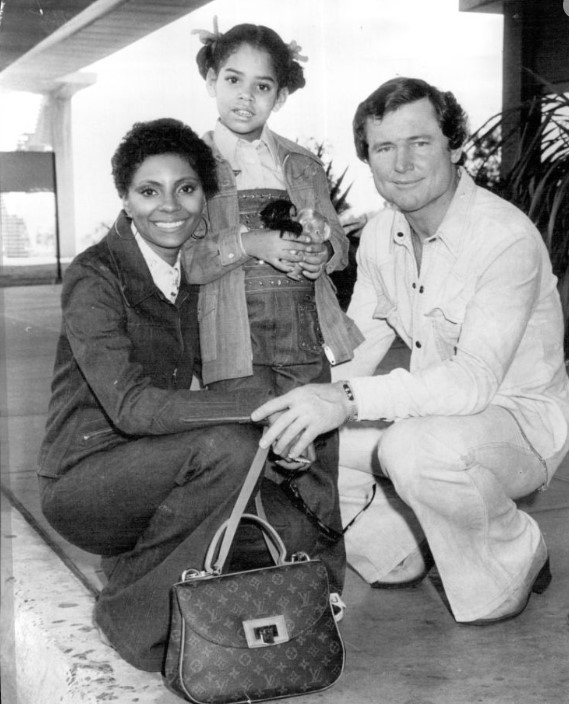
Leslie was well aware of the potential consequences that could arise from her involvement with a white man, as she had previously experienced such situations during her teenage years. Her aunt, a guiding figure in her life, had explicitly cautioned her against entertaining any thoughts of a future with someone of a different race.
Recalling a moment from a 1967 interview with Ebony, Leslie recounted, “I remember a striking incident when I was dating a white boy. He sent me a color picture of himself. I showed it to my aunt. He was undeniably handsome, with a cascade of beautiful hair. I thought he was exceptionally attractive. However, my aunt took one look at the photograph and embarked on a lecture. ‘Well, I suppose he’s fine for casual outings,’ she advised me, ‘but only for temporary company, right, dear? When you’re contemplating a lasting commitment, you’ll ensure that you marry a respectable [Black] man, won’t you?'”
Following her serendipitous encounter with Grahame, Leslie found herself continually drawn to him. She confessed, “I found myself gradually falling for him, a realization that carried considerable weight for a 21-year-old like me.”
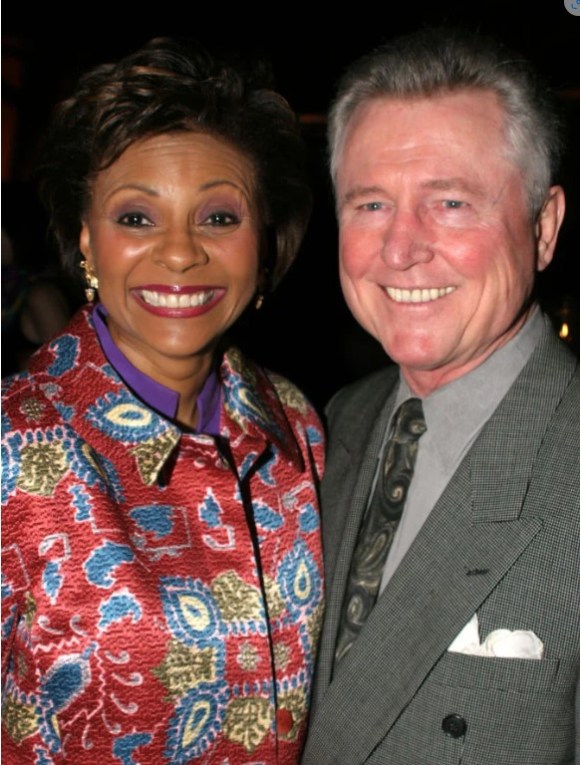
In a captured moment, Leslie Uggams and her husband Grahame Pratt graced the scene at the “Ain’t Nothing Like The Real Thing: How The Apollo Theater Shaped American Entertainment” reception, held at the Museum of the City of New York on February 7, 2011, in the vibrant heart of New York City.
Upon departing from Australia, a whole year would unfold before their next reunion. During this time apart, their love deepened, transcending Leslie’s initial reservations prompted by concerns about her family’s response and the implications that their relationship would hold. The challenge of Grahame’s relocation to the U.S. to align with Leslie’s career loomed ahead. The engagement lasted a solid five months, and amidst this period, Grahame embarked on visits to Leslie in New York.
Contemplating the potential hurdles that might arise due to her family’s views on mixed marriages, Leslie shared, “With awareness of my family’s stance, I was curious to ascertain whether their acceptance of Grahame was genuine or merely perfunctory.” However, Leslie’s anxieties were unfounded, as Grahame’s Australian origin brought with it certain advantages that quelled such concerns.

He lacked the self-consciousness that often taints the situation for white Americans in similar circumstances. He seamlessly integrated into my social circle without any pretense, genuinely connecting with my friends solely due to his affable nature. In turn, they reciprocated the sentiment, forming a positive rapport with him, transcending both gender and camaraderie.
Their union was solemnized in 1965. While residing in New York spared them much of the racial turbulence plaguing the rest of the United States, the couple wasn’t completely shielded from bigotry. “The marriage journey was less formidable than I had anticipated,” Leslie reflected during an interview. “I believe this was partly because Grahame wasn’t an American white man. Nonetheless, hate mail did find its way to us.”
“During my tours across the States, I’ve occasionally received anonymous letters critiquing my marriage to a white man,” Leslie disclosed. Sharing a disheartening episode, she recounted, “I recall one particularly unpleasant letter I received in Detroit. It arrived at the venue, addressed to ‘The Little Negro Entertainer.’ Such letters consistently bear derogatory labels, adding an unpleasant tone to my experiences.”
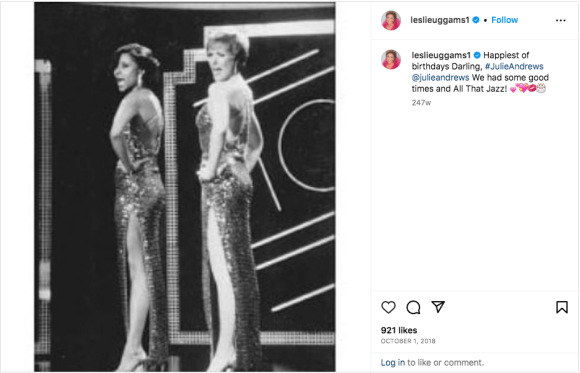
Assuming the role of Leslie’s manager, Grahame seamlessly took on the responsibility. Together, they embraced the joys of parenthood, welcoming their daughter Danielle in 1970 and their son Justice in 1976.
A snapshot of the dynamic duo, Leslie Uggams and husband Grahame Pratt, graced Broadway’s Plymouth and Royale theaters, now rechristened as The Schoenfeld Theater and The Jacobs Theater on 45th Street.
The year 1977 marked a pivotal juncture, arriving just twelve months after the birth of their second child. It was during this time that Leslie clinched the lead role in the acclaimed miniseries “Roots.” Her portrayal of Kizzy garnered her an Emmy nomination, a testament to her remarkable performance.
Continuing her streak of compelling roles, Leslie took on the character of Lillian Rogers Parks in “Backstairs at the White House” two years later. Her portrayal in this miniseries earned her an Emmy Award nomination for Best Actress, solidifying her status as a distinguished talent in the industry.
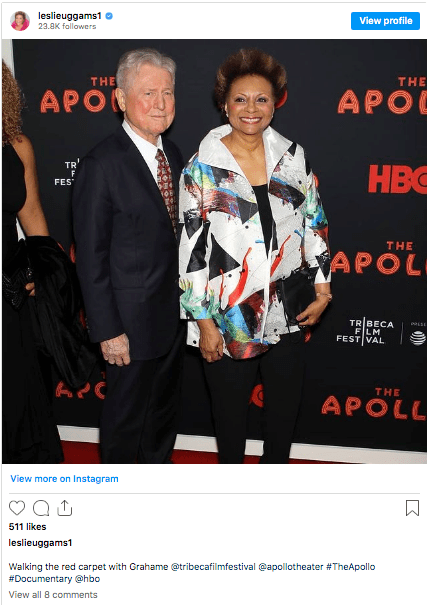
In 1996, she assumed the role of Rose Keefer in “All My Children,” showcasing her versatility. Notably, in 1983, her skill as a host on the NBC game show “Fantasy” earned her a Daytime Emmy Award.
Her charisma also graced various television programs through guest appearances. She animatedly appeared as herself on “Family Guy,” and her presence lit up shows like “I Spy,” “Hollywood Squares,” “The Muppet Show,” “The Love Boat,” and “Magnum, P.I.”
The enduring affection shared between Leslie and Grahame has defied time’s passage, remaining unwavering even after 55 years. Beyond their shared parenthood, their family extended to include granddaughter Cassidy.
Reflecting on the secret behind their enduring happiness, Leslie revealed, “Laughter fills our days — yet it’s not always smooth sailing. Our companionship is marked by enjoyment.” Their relationship stands as a testament to love’s resilience, a bond forged through shared laughter and genuine camaraderie.
In the face of all odds, their love story has flourished, proving its strength across the span of time. Their unwavering devotion and mutual support throughout the years serve as a remarkable source of inspiration, a testament to the enduring power of love.
Feel free to share this heartwarming love story with your friends and family!
It’s a tale of resilience, companionship, and enduring love that can inspire and uplift others. Whether shared in person or through various platforms, this story has the potential to touch the hearts of those who read it.

